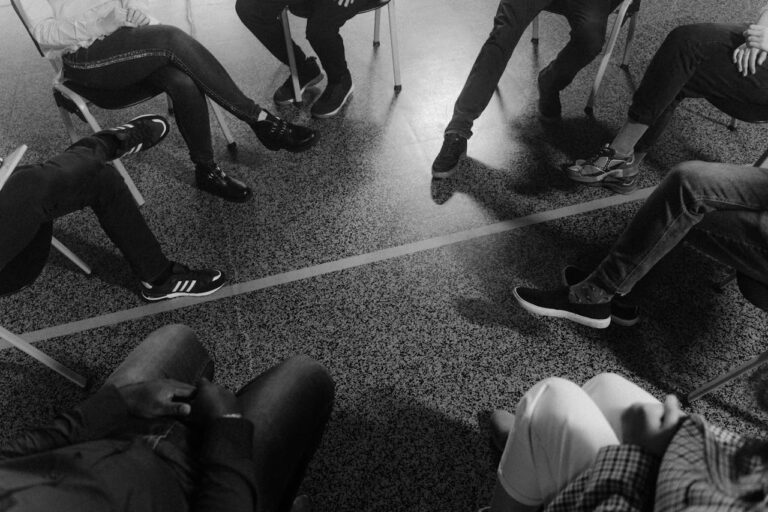A white pickup truck pulled behind a Whole Foods store in Minnesota, its tires crunching over a thin layer of snow. Two men loaded boxes of donated groceries into the bed — supplies bound for sober-home residents. From a distance, KARE 11 investigative reporter A. J. Lagoe and his team filmed the scene.
It looked routine. The billing didn’t.
Over seven months, Lagoe and his team uncovered how falsified treatment records and padded service logs siphoned millions from Minnesota’s Medicaid program. Vulnerable people were left without care. Nonprofits funneled public money to for-profit partners.
His team’s investigation, Recovery Inc., won the Silver Award in the Regional/Local category of the 2025 Barlett & Steele Awards for Investigative Business Journalism.
The first breadcrumb
The investigation began with a tip. “A source said something wasn’t adding up with a new company that was exploding and taking over the market for what’s known as peer recovery services,” Lagoe said.
Peer recovery services were a new and growing business. The model was simple: people who had overcome addiction were hired to help others do the same. It was built on empathy – and it was Medicaid billable. The tipster told Lagoe that one company seemed to be billing more than everyone else combined.
That was enough to pique his curiosity. “We set out to figure out how they were doing it, what was going on,” he said. “And all of our tips just kept telling us there were problems there.”
Understanding the fraud meant understanding the billing, and Medicaid data is anything but simple. Lagoe and his team filed open-records requests with the state, waiting weeks for data that, when they finally arrived, revealed only part of the picture.
The numbers showed an explosion of billing, but not what that billing represented. To prove wrongdoing, they needed the medical records of actual clients – and those records were protected under the Health Insurance Portability and Accountability Act (HIPAA).
“We started finding clients and asking them to request their own records,” he said. “Once we could compare what the treatment records showed with what the billing claimed, we began to see holes.”
One client’s file said she had received peer services at home on the same day she was attending her son’s wedding across town. When Lagoe asked if she had proof, she pulled up time-stamped photos from her phone.
Inside the fraud
Reporting on addiction recovery came with a distinct challenge: few people involved could be considered reliable by traditional standards.
“Everybody had a criminal history,” Lagoe said. “Everyone had red flags to some degree.”
In most investigations, journalists vet sources for credibility. That approach didn’t apply here. Many clients, peer counselors, and staff had histories of substance abuse or legal trouble. Lagoe had to build trust without assuming it.
He and producer Kelly Dietz spent months meeting sources in coffee shops, halfway houses, and apartments, walking them through the basics of journalism. “Here’s what ‘off the record’ means. Here’s what ‘on background’ means,” Lagoe would explain. “We need to verify everything you’re saying. That protects you and us.”
It took five months to find someone willing to share records publicly and attach their name to the story.
“That individual really showed a lot of bravery,” Lagoe said. “After that, the floodgates opened.”
Once they had the records, the discrepancies became clear. Some recovery centers billed for van rides listed as 45 minutes long that barely lasted 10 minutes. Others claimed one-on-one peer sessions that actually involved 17 people packed into a single vehicle.
“We went out and staked out places,” Lagoe said. “We’d follow the van, watch them drop people off. They definitely weren’t in the car for 45 minutes.”
As the team reviewed more files, they found centers inflating service hours by 25 percent. The data showed overlapping group sessions and patients billed for treatment while they were somewhere else entirely.
In one case, a facility billed Medicaid for services provided to a man who, at that exact time, was across town committing murder. Lagoe had previously covered the case – a mentally ill addict who had been failed by the system. “Watching him be sentenced for crimes he doesn’t even remember committing – that’s when you realize the system is broken,” Lagoe said.
Confronting power
By the time the first story aired, Lagoe and his team had been working on Recovery Inc. for seven months. They’d mapped the fraud, documented the billing patterns, and verified the personal accounts. What they didn’t yet have were answers from those responsible.
When officials refused interviews, Lagoe decided to confront them in person. “We never want to have as a first option just confronting someone on camera,” he said. “But when it’s somebody in power, we’re not going to take ‘no’ for an answer.”
During one encounter, Lagoe and photojournalist Gary Knox approached a mayor at a public meeting. “Gary and I have worked together for more than a decade,” Lagoe said. “He knew to stay glued with me.”
In another, the owners of Evergreen Recovery caught Lagoe staking out their building and invited him inside. “They thought they were going to talk us out of whatever we were reporting on,” he said. “And they just lied to us over and over.”
Then Lagoe pulled out a file: billing records for the same man who’d committed murder. The owners claimed he’d been in treatment at the time. “I’ll never forget the look on his face,” Lagoe said. “His jaw dropped.”
That interview would later appear, almost verbatim, in a federal search warrant. The FBI raided Evergreen’s offices soon after.
The fallout
When Recovery Inc. aired, the government’s response was immediate.
The Minnesota Department of Human Services launched audits and reforms. Federal agents opened criminal investigations. Within two years, more than 100 treatment companies were shut down, and entire Medicaid programs were suspended or rebuilt.
“They’re shutting down an entire Medicaid program because they can’t stop the fraud,” Lagoe said. “They’re promising to build it back with proper safeguards.”
Among the most tangible reforms: new electronic visit verification, requiring clients to physically sign off that they received a service before providers could bill Medicaid.
Every policy change came with a cost. Some centers that were shut down had, by many accounts, provided good care until greed took over.
“What keeps me up at night,” Lagoe said, “is that now there are fewer places for people to turn for help. Some people are probably ending up homeless because the housing tied to those centers was shut down. It was illegal and needed to be exposed, but it was still housing.”
The paradox of accountability weighed on him. Exposing corruption was necessary, but it also revealed how fragile the safety net had become. “There’s real-world fallout,” he said. “People are still being harmed.”
More than two-and-a-half years after the first story, Lagoe and his team are still reporting on Recovery Inc. “There’s not a day that goes by that I’m not working on some aspect of this investigation,” he said. “We’re still finding outrageous examples of harm.”
The U.S. Attorney’s Office has since called the fraud “billions of dollars” in scale. “We started with one story,” Lagoe said. “Now, every time we publish, we know there’s going to be a federal investigation.”
The work, he admits, can be exhausting, but outrage keeps him going. “Investigative reporters have been running on outrage for a long time,” he said. “If you stop being outraged by injustice, it’s time to find a new job.”











